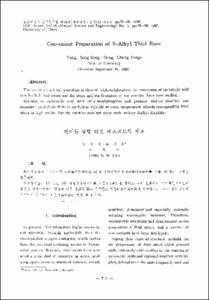다자간협상에 의한 환경관련 무역규제조치
- Alternative Title
- Environment Related Trade Measures by Multilateral Agreements
- Abstract
- 환경보호를 위한 조치는 무역정책을 수반하거나 혹은 직,간접적으로 무역에 영향을 미치고 있다. 이러한 무역 정책으로 동일한 환경 목표를 달성시킬 수 있으나, 무역정책은 오염원에 대한 직접적인 환경 정책보다 후생면에서 덜 효율적이며, 오히려 후생을 감소시킬 수 잇다. 그러나 환경 문제가 지구화되면서 국내, 국제적으로 환경 목적을 위한 무역규제 조치가 증가하고 있다. 그러므로 잠재적인 무역마찰을 최소화시킬 뿐만 아니라 지역적, 지구적 환경문제에 대해 가능하고 효과적인 해결책을 모색하기 위해서는 다자간 협력이 필요하다.
한편 한국은 국제 환경협약에의 가입에 따른 각종 환경 규제의 강화 등으로 에너지 수급구조를 비롯한 경제, 산업구조 전반의 변화가 예상된다. 따라서, 국제적인 환경규제에 대한 대책으로(1)경제적 성격의 환경정책수단의 개발,(2)공공 투자의 확대,(3)에너지절약형으로의 산업구조조정,(4) 국내 환경 산업의 육성,(5)세계환경시장으로의 진출,(6)환경기술수준의 제고와 대체품 개발촉진, 그리고 (7)자원재생산의 육성 등 종합대책이 강구되어야 할 것이다. 또한 국제 환경협상에 대하여도 환경규제가 우리의 국제무역에 불리하게 작용하지 않도록 대외교섭 노력을 강화하고, 국내 환경 규제기준 등을 국제 수준에 부합 되도록 조정하여 환경문제에 따른 대외 통상 마찰을 사전에 예방하여야 할 것이다.
Measure to conserve the environment involve trade policy or have direct or indirect implications for trade. Trade policy is used to attain the same environmental objectives, but it is less effective than direct environmental policy and reduces the welfare. But, trade measures are increasing both nationally and internationally because environmental issues become globalized recently. Therefore, multilateral cooperations are needed not only to minimize trade frictions but to identify effective solutions to regional and global environmental problems.
Therefore, participating in all international environmental agreements, environmental regulations will become more stringent and economic, industrial structures are expected to change greatly in Korea. Under these circumstances, the following policies are required 1) Development of economic instruments as means of environmental policy, 2) Increasing government spending for pollution abatement and control, 3) Adjustment of industrial structure to energy-saving, 4) Supporting environment related industry, 5) Access to the world environment market, 6) Improving the level of environment technology and substitutes development, and 7) Supporting recycling industry
.
Measure to conserve the environment involve trade policy or have direct or indirect implications for trade. Trade policy is used to attain the same environmental objectives, but it is less effective than direct environmental policy and reduces the welfare. But, trade measures are increasing both nationally and internationally because environmental issues become globalized recently. Therefore, multilateral cooperations are needed not only to minimize trade frictions but to identify effective solutions to regional and global environmental problems.
Therefore, participating in all international environmental agreements, environmental regulations will become more stringent and economic, industrial structures are expected to change greatly in Korea. Under these circumstances, the following policies are required 1) Development of economic instruments as means of environmental policy, 2) Increasing government spending for pollution abatement and control, 3) Adjustment of industrial structure to energy-saving, 4) Supporting environment related industry, 5) Access to the world environment market, 6) Improving the level of environment technology and substitutes development, and 7) Supporting recycling industry
.
- Issued Date
- 1995
- Type
- Research Laboratory
- Alternative Author(s)
- Choi,byongCheol
- Publisher
- 사회과학논집
- Language
- kor
- Rights
- 울산대학교 저작물은 저작권에 의해 보호받습니다.
- Citation Volume
- 5
- Citation Number
- 1
- Citation Start Page
- 199
- Citation End Page
- 217
- Appears in Collections:
- Research Laboratory > Journal of social science
- 파일 목록
-
-
Download
 000002025274.pdf
기타 데이터 / 377.1 kB / Adobe PDF
000002025274.pdf
기타 데이터 / 377.1 kB / Adobe PDF
-
Items in Repository are protected by copyright, with all rights reserved, unless otherwise indicated.